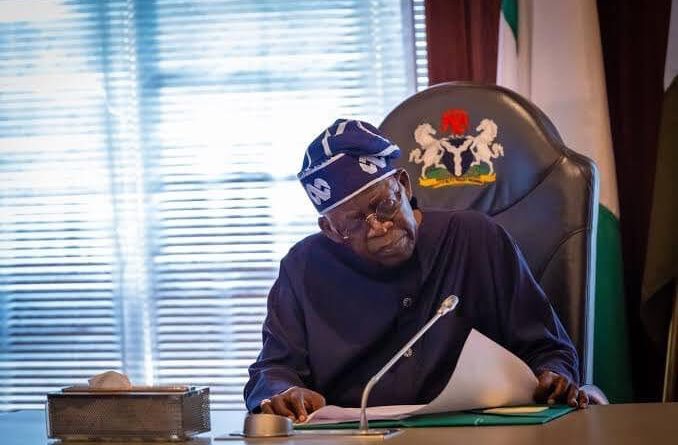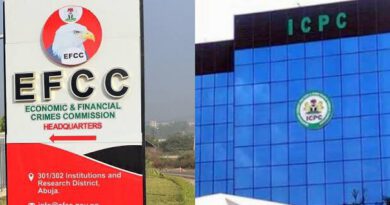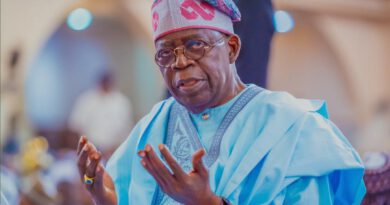Bello: Tinubu is fighting corruption differently – Presidency
President Bola Tinubu has strongly indicated that his administration aimed to become the country’s foremost leader that will battle graft to a standstill using lawful institutions against pervasive corruption which had become a clog in the wheel of Nigeria’s growth and development.
Tinubu expressed his determination to battle corruption differently from his predecessors after empowering the Economic and Financial Crimes Commission (EFCC) and other institutions for systemic changes that can stand the test of time.
Unlike his predecessor, Tinubu, according to the presidency, has signaled his administration’s plan to fight corruption differently and protect public funds using EFCC and other institutions empowered by law.
To solidify the President’s commitment to root out corruption, an aide to President Tinubu, while explaining the intention behind Tinubu’s anti-corruption style, explained that the former Lagos State governor is ready to eliminate graft in the country’s system and make all forms of corruption distasteful to both civil servants and public officers, including elected and appointed officials.
The source, who pointed to the President’s speech during the 6th EFCC-National Judicial Institute’s Workshop for Justices and Judges, urged Nigerians to unite against economic, as well as, financial crimes and other acts of corruption.
At the workshop, Tinubu described corruption as a cancer that Nigerians must rise against before it becomes unmanageable, saying No Nigerian is immune from corruption, a cancer that continues to deny the nation the full benefits of its God-given resources.
Pointer to the fact, the sources said, was the free hand Tinubu gave to anti-graft agencies, particularly the EFCC, to make the agencies more efficient and independent.
Aside from being efficient and independent, his administration is also focused on making these agencies more accountable and more of the reasons the Ola Olukoyede-led EFCC had been battling corruption headlong, starting from notable public figures, including Kogi State former governor, Yahaya Bello, who shared same political party ideology with Tinubu, he added.
Another male aide, who particularly craved anonymity, explained that Tinubu was committed to restoring public trust in government, hence his non-interference approach in the fight against corruption led by the EFCC boss.
According to him, Tinubu’s administration recognizes that success depends not just on institutional reforms but on changing the relationship between the government and the governed.
“The president is keen on re-establishing trust between the leaders, public officials – elected and appointed – and the Nigerian people. He knows that if citizens do not feel the impact of this fight, they won’t support it and this is about rebuilding faith in governance, which is a job understood well by the EFCC boss and he (Olukoyede) is leading the fight very well.
“That is why you see the EFCC starting the fight in-house. By in-house, I mean those who are members of the President party are facing the heat, a good example is the former governor of Kogi, Yahaya Bello. Tinubu’s approach to fighting corruption, through EFCC, represents a departure from the past,” he added.
As Nigeria continues to grapple with the effects of corruption on its economy and social fabric, Tinubu is committed to transforming Nigeria’s political and governance landscape, another presidency source hinted.
“Years of corruption and the misuse of public funds have left Nigerians and Nigeria frustrated and angry. But Tinubu is committed to moving the country from a culture of impunity to one where there are real consequences and that can be seen from how the bigwigs are being dealt with by the anti-corruption commission.
“The likes of Yahaya Bello, his colleague, Darius Ishaku, and others whose cases are being reviewed by the EFCC would soon be prosecuted and made to account for dipping their hands in the public purse. With his approach, it is evident that Tinubu is not cut for a selective anti-corruption fight, both allies and corrupt officials from other political parties won’t be overlooked,” the source said.
Also, a female source in the President’s office, who craved anonymity, said from his body language, Tinubu would investigate past officials and hold them accountable for corrupt practices.
According to her, Tinubu’s investigations, through the EFCC, won’t be impartial or politically motivated as he has laid down a unique and transformative approach that is set to challenge the status quo through the EFCC.
“President Tinubu understands that corruption in Nigeria is not just about a few bad eggs; it’s a deeply entrenched system that affects every facet of governance and society. The fight will go beyond arrests and prosecutions. It will dig deep into the fabric of governance,” she said.
She added, “Tinubu’s administration aims to avoid the pitfalls of selective prosecution and media-driven actions by embedding anti-corruption measures into governance. He doesn’t want quick wins or public show trials. He wants sustainable change that will outlast this government, a change which is being spearheaded by the Ola Olukoyede-led EFCC.”




